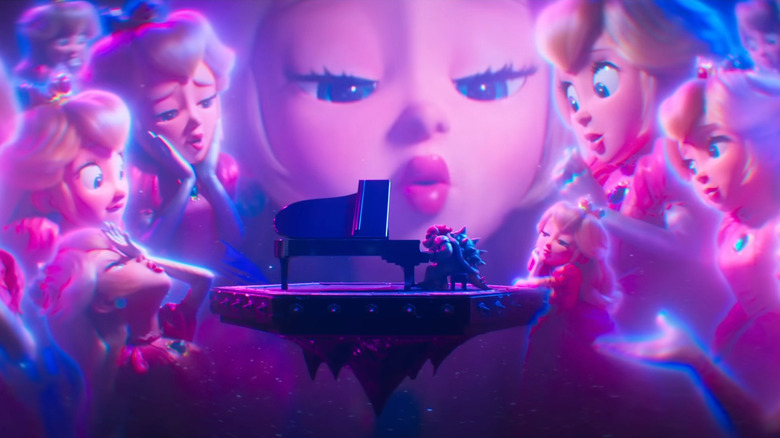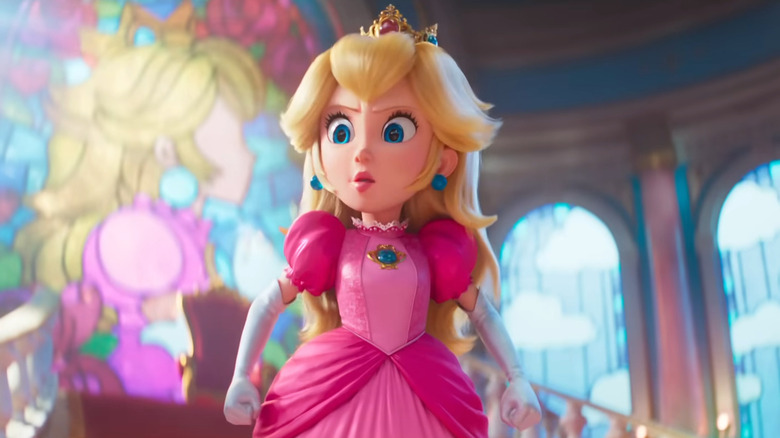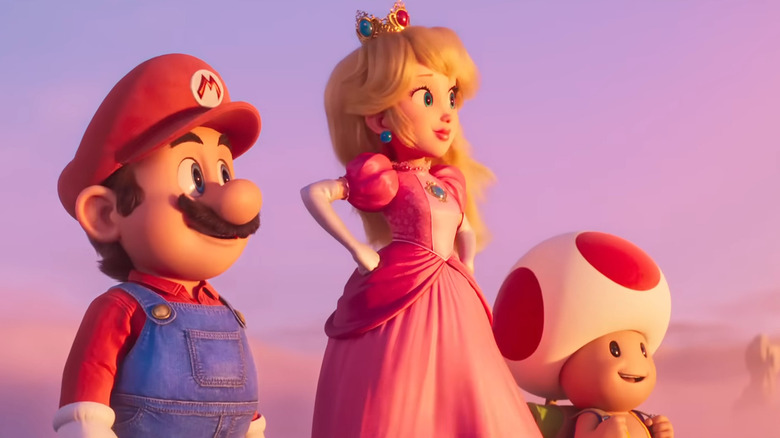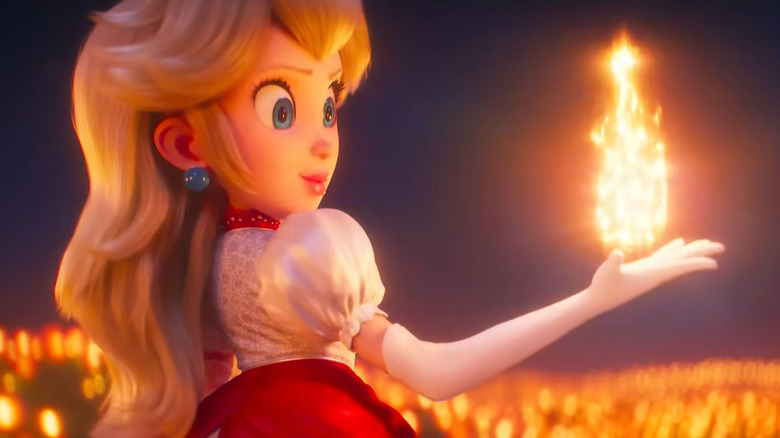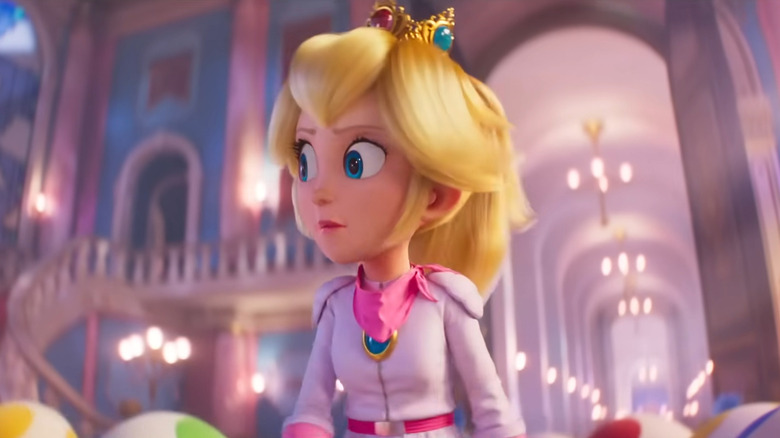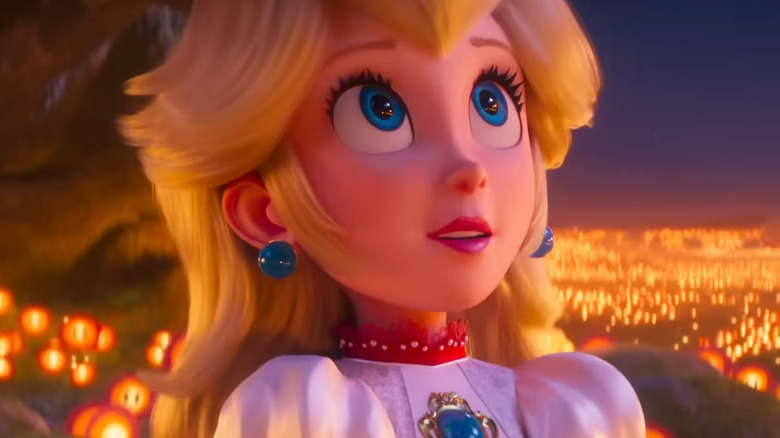Things Only Adults Notice About Princess Peach In The Super Mario Bros. Movie
There's not a single character in "The Super Mario Bros. Movie" that doesn't have fans of the franchise positively buzzing, but particular attention has been brought to Anya Taylor-Joy's rendition of gaming's most beloved royal: Princess Peach. As the capable leader of the Mushroom Kingdom, Peach becomes Mario's (Chris Pratt) partner in crime as the duo sets out to stop Bowser's (Jack Black) world-conquering machinations and save Luigi (Charlie Day) from his grasp.
The movie does a strong job adapting Peach's most enduring qualities from the games — her subtle romance with Mario, her trademark pastel pink look, and her willingness to get her hands dirty when it comes to stopping Koopa nonsense. In an appearance on the Total Film podcast, Taylor-Joy said that she was partially attracted to the role because the character could serve as a role model to the movie's child audience. However, there are a few intriguing elements specific to her iteration of the good princess that older fans may have been more likely to notice.
Why not Queen Peach?
Just like her in-game counterpart, the version of Princess Peach in "The Super Mario Bros. Movie" stands tall as the benevolent ruler of the Mushroom Kingdom and the Toads who reside within it. However, some older viewers may have noticed that her status as a princess is a bit of an oddity. Customarily, the title of princess is afforded to female members of royalty who are in line to inherit the throne, at which point, they would become queen. Yet Peach is no queen (in the traditional sense, mind you).
The "Mario" games have generally remained ambiguous on whether Princess Peach's parents are around, though they have been occasionally referenced in certain materials, such as the English instruction manual for the original "Super Mario Bros." Of course, the "Mario" movie takes a unique tack with Peach's origin story, with her entering the Mushroom Kingdom alone as a baby. She's ostensibly the single human resident of the kingdom and its sole ruler, so what's stopping her from upgrading her title?
Let's get the obvious reason out of the way — "Queen Peach" just doesn't roll off the tongue quite the same as "Princess Peach." Her moniker kind of makes sense in a metaphorical way, too. Peach was a child raised by the Mushroom Kingdom as a whole — its princess, if you will. Perhaps her title is meant to reflect that fact ... or, you know, maybe the Toads just don't know a lot about how royalty works. That's probably the more likely explanation.
Peach follows the Smurfette Principle
Ever thought about analyzing "The Super Mario Bros. Movie" through the lens of gender-centric literary tropes? If so, you're going to love this one. In this version of the "Mario" universe, Princess Peach finds herself in a classic example of the Smurfette Principle, a term developed by New York Times author Katha Pollitt in the early 1990s. As the idea goes, many stories in media revolve around a predominantly male group with a singular female individual among their ranks, whose characterization largely revolves around the fact that she is female. Such is the case with Smurfette and the Smurfs, hence the name.
While it can be argued that Peach's arc in the movie doesn't necessarily revolve around her gender (aside from the marriage bit, perhaps), it's true that she's quite literally alone as the only prominent woman not just in the Mushroom Kingdom, but in that entire world. Other female characters like Pauline and Mario's mom (both voiced by Jessica DiCicco) do appear in the movie, but they're all limited to the Brooklyn setting and don't share any real screen time with Peach. If one wanted to take the analysis a step further, it could be noted that "The Super Mario Bros. Movie" fails the Bechdel test, as no two female characters even get a chance to speak to one another.
These are some pretty serious-sounding critiques to apply to a family-friendly "Mario" movie, but they nonetheless support the idea that a sequel to "The Super Mario Bros. Movie" could do with more women in the line-up. Get Princess Rosalina or Princess Daisy in there. Even Toadette would do. Wendy O. Koopa? Birdo? Okay, we'll stop now.
Peach gets a brand-new power-up
Princess Peach is no stranger to power-ups, as both the movie and many "Mario" games have shown. However, die-hard fans who have played each of the mainline "Mario" entries may have picked up on the fact that the movie features the Mushroom Kingdom ruler using one particular power-up mainstay for the very first time.
In Bowser and Peach's wedding scene, the latter abruptly halts the proceedings when she uses an Ice Flower to freeze her would-be groom. This occasion actually marks the very first time that Peach has ever been seen powering up with an Ice Flower, as the item has never shown up in the titles where the princess herself is a playable character. The result is pretty cool (haaa) to see, as Peach's wedding gown converts into a fashionable icy dress.
Conversely, all of Peach's other power-up forms and outfits in the movie have canonical precedents in the games. Peach's Fire Flower ability and costume can be seen in games like "Super Mario 3D World," her wedding dress mirrors the one she wears in "Super Mario Odyssey," her biker outfit draws from her look in "Mario Kart 8," and her baby self draws from her design in "Mario & Luigi: Partners in Time." Neat stuff.
This Peach doesn't need saving
A close look at Princess Peach's history throughout the "Mario" series will show that her status as a capable and competent fighter in her own right is far from an idea manufactured for the movie. From "Super Mario RPG" on the SNES, in which she fights as a member of Mario's party, to "Super Princess Peach" on the Nintendo DS, in which she turns the tables and sets out on a quest to rescue a kidnapped Mario from Bowser, Peach has had an active role in many of the platforming plumber's adventures. However, there's also no denying that she often serves a damsel-in-distress role in the games — which couldn't be further from the truth for the movie's version.
If viewers pay close attention to Peach throughout the film, they'll find that there's never really a moment in which she directly needs to be rescued by Mario. He helps, of course, like by winning the favor of the Kong army and ultimately defeating Bowser in Brooklyn, but he never saves Peach from a situation she can't get herself out of. Even when the princess is kidnapped by Bowser and forced to marry him, she smuggles in an Ice Flower and stops the wedding herself — all before Mario and Donkey Kong have even arrived. All told, it seems this Peach isn't one that fans should expect to see dangling in a cage over a pit of lava at the end of World 8.
Peach and the pipe dilemma
As is made clear midway through "The Super Mario Bros. Movie," this iteration of Princess Peach doesn't know a whole lot about her past. Per her recounting of her earliest memory to Mario, she ended up coming to the Mushroom Kingdom as a baby via a warp pipe, and that's where she's stayed ever since. Peach clearly has a curiosity surrounding where she really comes from — and there are plenty of hints that she's not necessarily from Mario's world, despite being human — which begs the question: Why hasn't she explored the pipes herself?
Mario and Luigi's first foray into the Mushroom Kingdom via a pipe down in the Brooklyn sewers shows that it's not too difficult to travel between the two locations, as well as others. It's not as though the pipes are a one-way ride either, as characters are shown to be able to use the same pipe from either direction. By all accounts, the answers to Peach's questions about her origin have been well within her grasp for all this time, yet she seemingly hasn't done any exploring herself.
It's a minor plot hole, but a bit of a confounding one nonetheless. If Peach's backstory does get explored in a further "Super Mario Bros. Movie" adventure down the road, hopefully, this is one topic that gets addressed.
